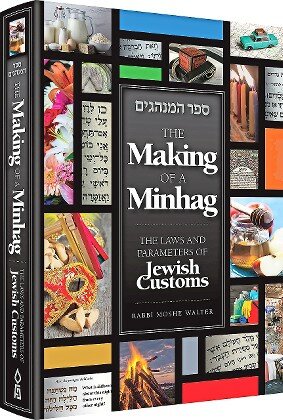For Elul, it’s minhagim and ‘L’David Hashem Ori’
In an eloquent and scholarly essay by Rabbi Moshe Walter, “The recitation of L’Dovid Hashem during the month of Elul,” in “The Making of a Minhag” (Feldheim, 2018), we learn fascinating aspects to Psalm 27 that is said daily during the month before Rosh Hashana. This essay takes us on a fascinating journey that teaches the rationale for the psalm’s recitation as a prelude to the Jewish New Year.
This daily recitation “has developed into one of the hallmark minhagim of this most auspicious time period on the Jewish calendar,” Rabbi Walter writes. As such, it behooves us to better understand and appreciate this powerful mizmor.
His essay addresses practical halachic issues that surround L’David, tracing the source of the addition of L’David to our daily tefillah during Elul and Tishrei, and to the siddur in general. He explains the reasons suggested for its recitation and the reasons many great sages opposed the custom, but ultimately concludes that its recitation is the correct liturgical path, a path to teshuvah at a critical point in the Jewish calendar.
Rabbi Walter’s conclusion gives us a unique lesson about the depth and true meaning of repentance.
Chazal consistently stress the importance of minhag, including statements like “minhag of our fathers is Torah,” and “the minhag of our fathers is in our hands.” The issue of the recitation of L’David is similarly based upon communal minhag, which was of primary importance when halachic authorities decided upon its recitation, lack of recitation, and duration of recitation.
“The powerful words of L’David were the driving force for those who supported the institution of L’David’s recitation. Those whose custom it is to recite L’David should recognize the unique opportunity to recite this mizmor during Elul as a preparation for the holidays of the month of Tishrei, and during the month of Tishrei as an added component of tefillah.”
It is this aspect of liturgical reasoning that gives this sefer the heft that makes it a must-read at this time of year. Rabbi Walter teaches us the great value of our sages’ teachings. He is to be commended for this essay, which enhances appreciation of our liturgical tradition.
Consider the following final thought:
“The theme of the entire mizmor is one that speaks of man’s yearning and passion for closeness with Hashem. The emotions, which David Hamelech elicits in this chapter, are the essence of how every individual should approach these special days.
“Reciting the powerful words of this mizmor twice daily for close to two months helps concretize and focus on the job of the Jew during Elul and Tishrei.”
Previously published.

 80.0°,
Partly Cloudy
80.0°,
Partly Cloudy 




